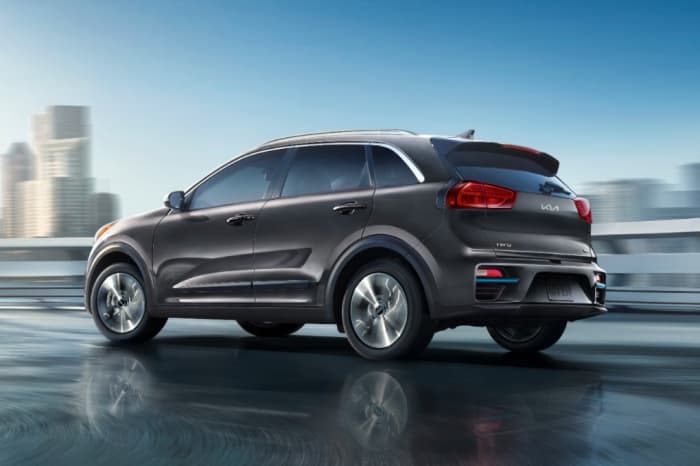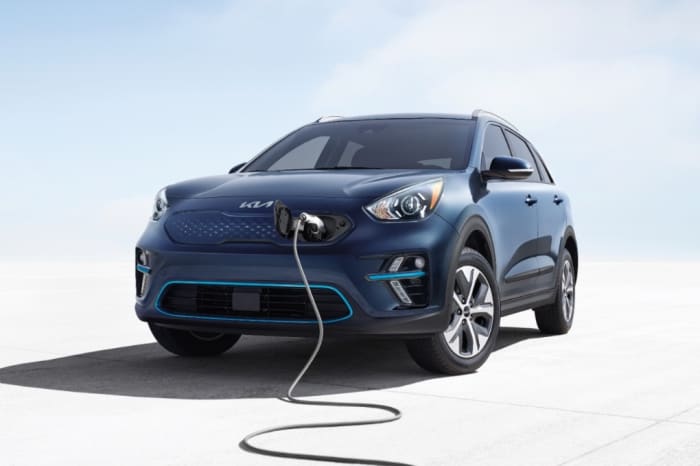This post was originally published on this site
Pros
- 239-mile range
- Spacious and practical interior
- Unbeatable warranties
- Standard driver assistance features
Cons
- Limited availability
- No option for all-wheel drive
- Pricey
What’s new?
- Base EX trim gains remote-start feature
- EX also updates to wireless smartphone integration
- Driver attention monitoring becomes standard
- Rear occupant alert added
- EX Premium receives more driver aids
Price: The 2021 Kia Niro EV starts at $39,090.
The 2021 Kia Niro EV is an all-electric small car with a crossover vibe, able to travel for 239 miles on a single charge. That’s not class-leading, but it’s still absolutely respectable. The Hyundai
HYMTF,
Kona Electric and Chevrolet Bolt EV have an advantage of around 20 miles, but the Niro EV still beats the Nissan
NSANY,
Leaf Plus, whose range is 226 miles.

The 2022 Kia Niro
Kia
There is some intercompany rivalry here because Kia
000270,
and Hyundai are so closely related. The Niro EV has the same power output as the Kona Electric, but costs more. If that’s the case, why buy a Kia Niro EV instead of Hyundai Kona Electric? Passenger space and cargo area might be the deciding factors.
Both have 37.7 inches of rear headroom, but the Niro EV enjoys 36 inches of rear legroom; the Kona has 35.2 inches. And the Niro’s maximum cargo volume is bigger by 7.2 cubic feet. The Niro EV deserves consideration for buyers willing and able to sacrifice a bit of range for extra practicality.
Right now, the Kia Niro EV is for sale in a limited number of states: California, Connecticut, Hawaii, Georgia, Maryland, Oregon, Rhode Island, Washington, and Texas.
This electric vehicle (EV) is one of three distinct Niro variants. The others are a gasoline/electric hybrid and a plug-in hybrid. They all come with the typical and unbeatable Kia warranties. That’s a 5-year/60,000-mile bumper-to-bumper warranty and a 10-year/100,000-mile warranty for the powertrain. The 2021 Kia Niro Hybrid and Niro Plug-In Hybrid each have their own separate reviews.

The 2022 Kia Niro
Kia
2021 Kia Niro EV pricing
In EX trim, the 2021 Niro EV has a Manufacturer’s Suggested Retail Price (MSRP) of $39,090, plus a destination charge. The higher EX Premium model starts at $44,650. Is the 2021 Niro EV eligible for a federal tax credit? Yes, the full $7,500. Various state incentives are also available.
For comparison, the 2021 Hyundai Kona Electric starts at about $38,000, the Chevrolet Bolt EV begins at $37,500, and the Nissan Leaf Plus at approximately $39,000. The least expensive Tesla,
TSLA,
the Model 3 (not a crossover, but with a 263-mile range), comes in just below $37,000.
Before buying, check the KBB.com Fair Purchase Price to find out what others in your area are paying for their new Niro EV. Tesla enjoys strong resale values, but both the Niro and the Kona should fare better than the Leaf.
Driving the 2021 Kia Niro EV
By placing the large and heavy battery pack under the floor, the Niro EV has a low center of gravity that imparts a feeling of stability when driving on the highway. This would normally help with handling as well, but the weight of the battery (about 1,000 pounds) tends to blunt the modest athleticism baked into the Niro’s suspension.
However, the Niro EV does have a compact turning circle that’s useful when dealing with tight city streets. And the good thing about electric motors is that their maximum torque is ready for action virtually from a standstill. The 291 lb-ft of torque is sufficient thrust to push the Niro EV off the line and hit 60 mph in a fairly fleet 7.8 seconds. And there’s still passing power at higher speeds.
Check out: The 2022 Nissan Leaf vs. 2022 Mini Electric—which is better?
Interior comfort
Although the 2021 Niro EV is similar in price to a Tesla Model 3, an electric vehicle considered to be something of a premium car, the Kia’s cabin looks decidedly mainstream. Yes, some design aspects work well, along with a logical layout, plus the occasional use of soft-touch plastics and comfortable seats. But don’t expect too much.
As we’ve already mentioned, the Niro’s cabin is relatively spacious. And the 60/40 split/folding rear seats add some versatility. In the everyday luggage area, there’s 18.5 cubic feet of space. Folding down both rear seats expands that to 53 cubic feet.
Exterior styling
A covered nose where a grille would usually go on a conventional combustion-powered car is a minor giveaway that the 2021 Niro EV is a tad out of the ordinary. That’s one of the few hints, though, along with blue bumper accents. The rest of the Niro EV certainly doesn’t shout its eco-friendliness.
There is the small matter of deciding exactly what kind of car the Niro EV is. Roof rails, a slightly higher-than-average ride height, and black plastic around the wheel wells all point to crossover aspirations. Although if someone called it a hatchback, there wouldn’t be much argument from us.
At least there’s not much stooping or bending required when strapping toddlers into child seats. Or indeed for older joints that might be getting creaky while entering or exiting a car.
Read: Subaru is making an EV. When can you get one?
Favorite features
Electric Drivetrain
When electric vehicles first came out, the best they could achieve was about 80 miles, giving rise to the phenomenon of range anxiety. That’s now as antiquated as an iPhone 4. The 239-mile range of the 2021 Niro EV might easily add up to a week’s worth of driving. So it probably won’t need charging every night.
EX Premium Infotainment System
The top trim of the 2021 Niro EV lineup has a sweet infotainment system that includes a 10.25-inch high-resolution touchscreen, navigation, wireless charging, and an 8-speaker Harman Kardon audio setup.
Standard features
Trim levels for the 2021 Niro EV lineup are EX and EX Premium. EX comes with 17-inch alloy wheels, fog lights, heated side mirrors, roof rails, keyless entry/start, remote start, cloth upholstery, 10-way power-adjustable driver’s seat, heated front seats, leather-wrapped steering wheel, and automatic climate control with a driver-only AC function.
Don’t miss: How does this car seem to run on almost nothing? It’s really quite something
The infotainment system features an 8-inch touchscreen, satellite radio, USB port, wireless Apple
AAPL,
CarPlay/Android Auto smartphone integration, and a 6-speaker audio setup.
Standard safety equipment includes forward-collision warning with automatic emergency braking and pedestrian/cyclist detection, rear occupant alert (new this year), driver attention warning (also new), blind-spot monitoring with rear cross-traffic alert, and adaptive cruise control with a stop/go function.
Factory options
EX Premium adds a powered tilt/slide sunroof, simulated leather upholstery, heated/ventilated front seats, ambient LED cabin lighting, LED taillights, and rear parking sensors. The infotainment system in this trim is upgraded to include a 10.25-inch touchscreen, but this arrangement is not compatible with wireless smartphone integration, so it’s back to the cable here.
Wireless phone charging, navigation, and an 8-speaker Harman Kardon audio system also come in at the EX Premium level, along with Highway Driving Assist and navigation-based Smart Cruise Control — both of which are new for 2021.
The main option for both of the 2021 Niro EV trim levels is a Cold Weather Package ($1,100). It includes a heater for the battery, a heated steering wheel, and a heat pump. This latter item is a more efficient means of raising the temperature in the cabin, and it offsets the typical drop in performance that happens with batteries in extremely cold weather.
Other extras include minor additions such as crossbars for the roof rails, a cargo cover, mudguards, and aluminum scuff plates.
Battery power, charge times, and range
No noise, no emissions. The electric motor in the 2021 Niro EV generates 201 horsepower and 291 lb-ft of torque, taking energy from a lithium-ion battery pack and driving the front wheels. All-wheel drive is not available.
Read: Do electric cars cost more to insure?
For vehicles using alternative energy (as opposed to just fossil fuel), the Environmental Protection Agency (EPA) calculates miles-per-gallon equivalent figures — or MPGe. The agency estimates that the Niro EV achieves 112 MPGe over the combined cycle.
A full replenishment of the battery takes 9.5 hours using a 240-volt supply. A DC fast-charging station can supply up to 80% of capacity in 75 minutes.
Permanent magnet electric motor
64-kWh lithium-ion battery pack
201 horsepower
291 lb-ft of torque
EPA city/highway fuel economy: 123/102 MPGe
Range on a full charge: 239 miles
This story originally ran on KBB.com.

